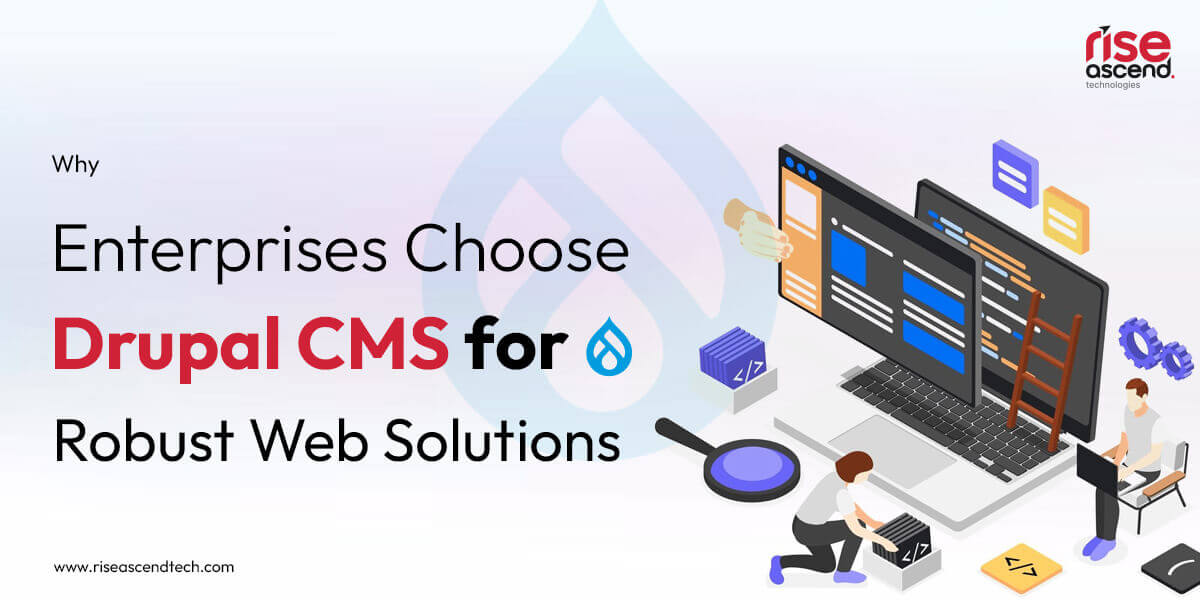Concerned about missing the chance to enhance your websites? Well, fret not! The end-of-life date for Drupal 7 has been extended from November 1, 2023 to January 5, 2025. So, take a moment to relax and discover the best way to handle this news and plan your next steps.
Within our article, we will delve into the forthcoming alterations, the potential risks associated with maintaining Drupal 7 websites, the advantages of upgrading to Drupal 10, and effective strategies to ensure a seamless transition.

What is Drupal 7 end of life (EOL)?
The termination of support and updates for Drupal 7 core, known as Drupal 7 end of life (EOL), will occur on January 5, 2025. Following this official EOL date, the Drupal community will cease providing security updates, bug fixes, and maintaining certain infrastructure for Drupal 7 websites. Consequently, Drupal 7 websites will no longer possess sufficient security measures to safeguard your data. Additionally, these websites will not receive any updates to ensure stable performance and a seamless user experience. In light of these circumstances, the Drupal community strongly advises all Drupal 7 users to migrate their websites to the latest Drupal version.
What changes to expect?
Ensure a seamless transition to the latest Drupal version by carefully considering additional restrictions imposed by the Drupal community.
Before January 2025
The modules and themes on drupal.org that are labeled as unsupported will no longer be maintained and marked as supported again. The Drupal community will not offer protection for the unsupported D7 modules and libraries, such as CKEditor 4. However, non-critical D7 issues will still be addressed by the Drupal community to reduce security risks, allowing you to continue checking for updates.
The Drupal core team has already stopped supporting PHP 5.5 and is contemplating raising the minimum PHP version requirement to discontinue support for others in the future. To avoid any complications with these updates, it is advisable to consult a tech vendor with expertise in Drupal to update your website to PHP 8. Additionally, Drupal will not provide support for third-party libraries for D7, including jQuery.
Before January 2025
After the designated end date of Drupal 7 support on January 5, 2025, the Drupal community will no longer provide assistance for any activities related to the development of Drupal 7 modules. Consequently, the Drupal 7 branches will be classified as unsupported. To further enforce this, the Drupal team will eliminate certain components of the Drupal.org infrastructure, resulting in the cessation of functionality for certain Drush commands. Moreover, owners of Drupal 7 websites will be notified that their websites are no longer secure. It is possible that third-party scans may detect D7 websites as being insecure.
The risks of running Drupal 7 after end of life
If you intend to continue using Drupal 7 even after its end of life, it is crucial to be well-acquainted with the potential risks that may arise in the future.
Security risks
Due to the lack of official updates for your website following the end of support for Drupal 7, your data may be at risk of malicious attacks. The exposure of critical vulnerabilities in D7 could increase the likelihood of security breaches targeting your website.
Limited partnership formation
Having D7 websites labeled as insecure implies that tech vendors will be less inclined to collaborate with business owners who have outdated websites. The presence of an insecure and outdated website can have detrimental effects on your organization’s reputation. Users and potential partners will be unable to trust your website, resulting in a loss of credibility and missed business prospects.
Userbase losses
The Drupal community has ceased developing new features for Drupal 7 websites, resulting in business owners being unable to access new functionalities and third-party services. As a consequence, outdated websites may experience decreased compatibility with contemporary web browsers and server environments. This could potentially result in functionality and performance issues, ultimately diminishing the value of your business and alienating end users.
Reduced search optimization
Google search engines give priority to secure and updated websites when ranking search results. Having an outdated and potentially vulnerable website can result in a decline in your website’s search engine ranking, which in turn reduces its visibility and traffic.
Remaining with Drupal 7 poses a considerable risk as it exposes your website to numerous hazards, such as security vulnerabilities, diminished functionality, absence of community support, potential reputational repercussions, and loss of users.
Benefits of upgrading from Drupal 7 to Drupal 10
Regular security upgrades for Drupal 10 will increase the dependability of your website. Drupal 10 will safeguard your website for many years to come because updates and support will be provided. Increased security will also draw in more clients and partners who will respect your dependability and put their initiatives and needs in your hands.
Upgrading to Drupal 10 guarantees you will get ongoing support from the Drupal community. To keep your website up to date, you will continuously receive new design themes, open-source modules, and system integrations.
Your business processes will all be improved by the website you obtain after upgrading to Drupal 10, even though the migration procedure can take some time. You’ll receive better performance, better UI/UX, higher security, and community support.
Community support
Drupal 10’s enhanced caching and scalability result in a faster page load time and greater room for expansion. The Drupal core has been completely reworked and is now based on the latest Symfony framework version, giving it unprecedented flexibility and performance gains. Furthermore, PHP 8.1 is a minimum requirement for Drupal 10, which has shown to be far faster than earlier versions.
Increased performance
The improved editing experience provided by Drupal 10 makes website managers’ and content producers’ jobs easier. With an integrated visual design tool, they can rapidly produce visual layouts for content display. Drupal 10 has an intuitive drag-and-drop interface for creating bespoke landing pages and for customizing the organization of content. The content production process has also been revitalized by the default theme, Claro, which makes it simple and intuitive. Consequently, your website’s visitors have a pleasant experience and can easily navigate through the material.
Improved UI/UX
Enhanced security
You should upgrade your website to Drupal 10 (the most recent version) to prevent the hazards connected with Drupal 7 EOL. Prepare to take advantage of new features in Drupal 10 that will boost your data security and draw in more end users! The following are the advantages of the D10 upgrade:
How to ensure a smooth transition?
The level of difficulty in website migration is determined by the size and organization of your website. Regardless, every migration is a meticulous procedure that necessitates an experienced Drupal team to assist you in enhancing your website.
Our team of Drupal developers actively participates in enhancing the CMS by developing patches and modules. Our developers possess extensive knowledge of Drupal and consistently keep abreast of the latest features and tools.
Given that Drupal 7 has been given an extended end of life, there is ample time available for you to migrate your website with minimal risk and downtime. In order to ensure a seamless transition, it is important to clearly define your requirements and goals, which can then be effectively communicated to a technical vendor. By providing clarity on aspects such as design, scale, and features, you will greatly assist the team in realizing your vision for the upgraded website.
Takeaway
Websites that are currently using Drupal 7 will soon lose support, which is why it is highly recommended by the Drupal community for website owners to upgrade to the latest version, Drupal 10. While there may not be a direct upgrade path and the migration process may seem complex, our team of professional Drupal developers can assist you with this transition. Upgrading to Drupal 10 will not only enhance the security of your website but also improve its scalability and provide access to new features. Take advantage of the Drupal 7 end of life in 2025 to elevate and expand the functionality of your website.
Our experienced Drupal developers can help you carefully plan the migration process to minimize any potential disruptions and incorporate features that will attract more end users to your website. Get in touch with us today to start discussing your migration project.





